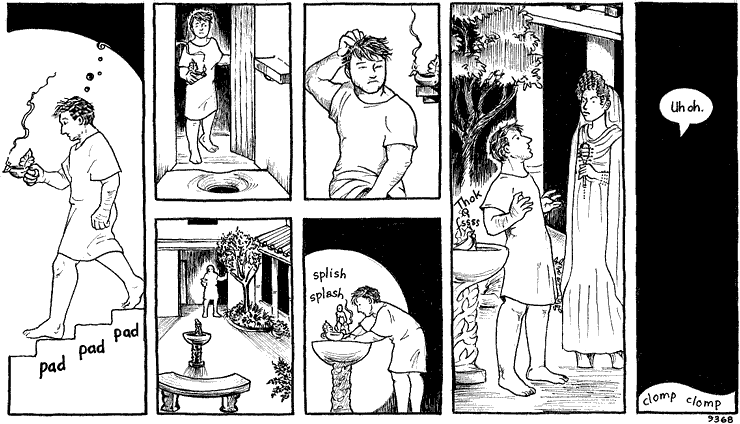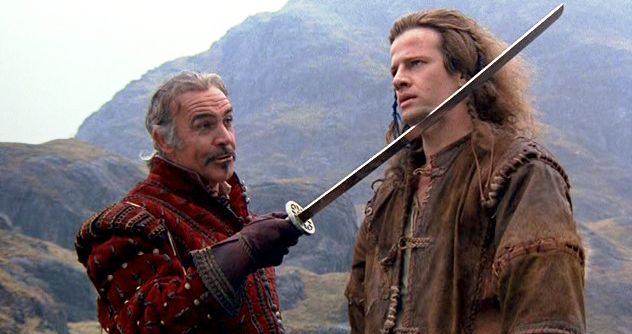This week we’re lucky enough to have an interview with Carol Burrell, AKA Klio, the very talented lady behind the SPQR Blues webcomic.
History Mine: Without spoiling your plotline too much, would you consider SPQR Blues to be counter-factual, or straight historical fiction?
Klio: There’s very little in it that couldn’t have happened. Occasionally people show up in places other than where they’re believed to have been at the time, but in the historical record there’s an awful lot of “his whereabouts for the next five months are unclear, but he must have been in Rome in December because he poisoned his cousin during the Saturnalia party.”
There’s a little timeline compression once our hero Felix gets to Herculaneum, so events happen over the course of a year that probably took three years in reality (if you squint, it still works out). One thing I think separates it from straight-up historical fiction is that, although most characters are based on real people, the main viewpoint is about Felix, who is entirely made up.
 But even he is based on an unnamed person found at Herculaneum. The really counter-factual part is the story he gives about his ancestry, and then how the historical figures react to it. Could it have happened? It gets a “plausible.” Pretenders showed up all the time, so there’s precedent. I hope that’s not too much of a spoiler!
But even he is based on an unnamed person found at Herculaneum. The really counter-factual part is the story he gives about his ancestry, and then how the historical figures react to it. Could it have happened? It gets a “plausible.” Pretenders showed up all the time, so there’s precedent. I hope that’s not too much of a spoiler!
HM: When you set your story in the shadow of Vesuvius, it’s a bit of a Chekov’s Gun. I’ve said similar things before about setting a film on the Titanic. Why did you choose this setting?
K: SUCH a big gun. Chekhov’s cannon. The fact that anything set near Vesuvius takes place in a running hourglass adds automatic urgency–when will it erupt? who will escape? will the kitten be rescued? In my early teens we studied an ancient lawsuit involving a girl named Petronia Iusta who lived in Herculaneum, and I became fascinated by how the city is a time capsule (and Pompeii too of course). We know so much about ordinary people as individuals with names and jobs and homes and comfy chairs.
It became much more interesting than the usual course of learning about emperors and assassinations and wars and epic poetry, which ignores the main substance of a culture’s life (and incidentally almost always cuts out the women’s experiences). I started tinkering with characters, and two things happened along the way: September 2001 and August 2005. I believe modern Americans and ancient Romans have a lot in common in their mindsets and motivations. It occurred to me to contrast the ancient response to a shattering disaster with the modern one. All those things rolled into one another and propelled an idea that had already been percolating.
 HM: I know there has been a lot of speculation about what the title refers to, and you have stated that it refers to the city watchmen, but I wondered whether it might also be a reference to NYPD Blues, The New York Police Department. Is that true?
HM: I know there has been a lot of speculation about what the title refers to, and you have stated that it refers to the city watchmen, but I wondered whether it might also be a reference to NYPD Blues, The New York Police Department. Is that true?
K: Yes! I grew up surrounded by that culture through my father and his friends. Guys in blue who seemed very big and impressive (and loud-cussing, and hard-drinking, and sometimes a little crazy, and loyal). It was an easy theme to fall into. The title was an offhand joke, but ended up influencing the story a lot.
HM: Did you originally intend this to be a cop story?
K: Yes, again. A sort of a cop soap opera. Man with a secret arrives in a town with its own mystery. “Who wants to kill Petronia Iusta?” And “Will she be consigned to life as a slave?” And “Will the cop get the dame?” And then, “Whodunnit?” Noir and actiony and with lots of stabby escapades. Other elements got stirred into the plot pot (the conflict between Felix and his Jewish relatives, that new religious cult, crisscrossed love stories). Once the comic got started, it wanted to be something different than I originally thought it was going to be.
 HM: How do you research a series like this?
HM: How do you research a series like this?
K: Everywhere I can! I studied Latin in high school and Greek and Classical Studies after, so I had that background in knowing where to find reliable resources. I keep up on what’s available in scholarly books through things like the Bryn Mawr Classical Review; and I go to original sources whenever possible–eyewitnesses, the poets and playwrights who wrote social commentary, early historians (taken with a grain of salt, but their spin is part of the fun).
Since Herculaneum and Pompeii are preserved, you can look at what was actually there. I’m sure I get things wrong, either from a gap in research or from eliding over details when I don’t feel like drawing all the pleats in a tunic, but when I’m revved up I’ll pull out a couple of books, look at frescoes, and study statues if I want to make sure everybody is wearing plausible sandals.
 HM: Possibly related, where does the inspiration come from?
HM: Possibly related, where does the inspiration come from?
K: Along with the Petronia Iusta case, from my overall love of Romans, and from studying every scrap I could find about Marcus Antonius and his family. Two branches of my family are Italian, so I was already tilted in that direction. Plus, I was getting frustrated by the pop-culture “ancient Rome” being taken as how things really were by some political pundits (whose names and cable network I’ve forgotten), so I have to give them part of the credit for making me pick up a pen.
I love sword-&-sandals movies, shows like Xena, gladiator time-travel romance novels, but those are for fun. Richard Burton and Victor Mature swooning over Jean Simmons looks pretty and there’s exciting music during the chariot races–give me Cinemascope and Technicolor and I’ll be happy all day. But I wanted to create something that has more to it. Also, alas, no gladiators.
HM: Are there any Roman practices that you enjoy exposing for your readers?
K: Showing the nitty gritty of the daily grind. I have no qualms about drawing a toilet. Showing that people thousands of years ago got on with things in a kind of modern-feeling way–doing the laundry and scrubbing pans and sending birthday notes and filling out bureaucratic forms in triplicate. I wanted to show that ancient people had deep and meaningful spiritual and moral beliefs, that their religious conviction was more than fancy temples and marble statues and names in a mythology book. That women worked around the restrictions placed on them. That “Antony and Cleopatra” may not be what we think it is.
The political pundits I mentioned before were, for some weird reason, holding up Rome as an example of how western culture has never allowed gay marriage; part of the comic is about what it meant to be gay in a society that on the one hand worships “traditional” marriage, and yet on the other hand was perfectly fine with what we would consider a modern definition of homosexuality and de-facto same-sex marriage as long as people behaved otherwise “respectably.” The time period also reflects on the conflict in the Middle East–the hero’s frustration that all the awful things done there were supposed to end the problems. So…there’s a lot going on.
HM: What’s with the bears?
K: Gotta love bears. They’re fierce, protective of their own, and deceptively cuddly-looking. Before I started SPQR Blues, I did a one-shot comic of a “police officer” in Herculaneum pondering how to get a cow down from on top of an arch. Vesuvius blows up, problem solved. I recreated the scene in SPQR Blues, and a bear seemed more likely to have made it up an arch. Readers liked the bear, asked when it would show up again, somewhere along the line it acquired a name (Sweetums), and there were many requests (stern demands) that Sweetums survive the eruption. Plus I’m so horrified by the idea of bear-baiting as entertainment that I agreed that the comic could use a bear hero who wins in the end.
Thanks very much Klio for taking the time to talk to us! Please go and check out SPQR Blues for yourselves. If you like it, please feel free to support it via Patreon.












